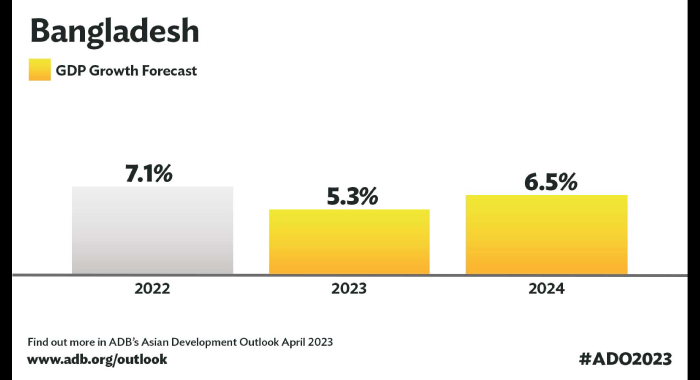Bangladesh’s exports and imports as percentage of its gross (GDP) has been falling gradually
The Bangladeshi economy has sustained an impressive growth rate of 6.5% per annum in the last ten years, yet a concerning trend has emerged as the percentage of exports and imports in relation to the nation’s gross domestic product (GDP) has steadily fallen. Recent data from the Bangladesh Economic Review 2023 indicates a marked drop in the trade-GDP ratio, with the export-to-GDP ratio experiencing a particularly sharp decrease from 17.2% a decade ago to just 7.66% in FY23.
This decline has raised significant questions about the accuracy of national income estimations, as the country’s international trade’s contribution to its expanding economy has halved during this period. Analysts are pointing to potential flaws in GDP calculations and expressing concerns over the reliability of the figures provided by the BBS.GOV.BD.
Experts have highlighted the importance of export diversification and the need to address issues surrounding tariff protection. The recently introduced national tariff policy revealed a substantial reduction in Bangladesh’s average tariff protection rate, which has dropped from over 70% two decades ago to 30.58% in FY23. While this reduction is intended to promote efficiency and competitiveness, some economists argue that a more strategic approach to providing incentives and tariff protection is necessary.
Notably, trade and economic experts emphasize the critical connection between a healthy trade-GDP ratio and the country’s ability to manage import bills, build foreign exchange reserves, and service debt. The decline in the proportion of trade to GDP raises concerns about the nation’s financial stability and its ability to sustain its economic growth trajectory.
To counter this trend and promote sustainable economic expansion, analysts recommend leveraging Bangladesh’s comparative advantages to bolster exports. Calls for a more time-bound and targeted approach to supporting local industries have also emerged, emphasizing the importance of nurturing industries to maturity without fostering dependence on continuous government aid.
As Bangladesh navigates these economic challenges, attention to trade policies, export diversification, and strategic industry support will be key to ensuring a balanced and resilient growth path for the nation’s economy. Read more the orginial source

